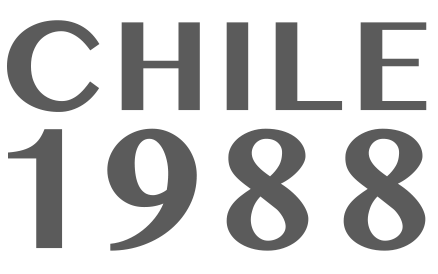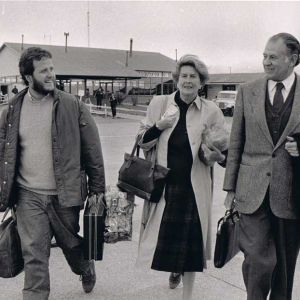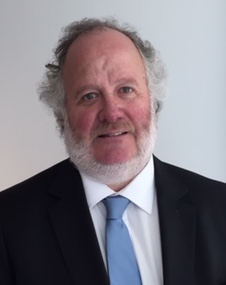I never heard at home when I was a child that my dad was going to be president or that he wanted to be president or that he would like to be president. What they say is that when he was a child, my grandmother used to tell him, “Son, when you grow up, you’re going to be president.” But that’s like me telling my son, it’s an act of pride, as we say here in Chile. These circumstances unfolded gradually. Before ’87, there is literature, around 1985 or 1986, my dad gave an interview to the magazine Análisis, I think, where he said, “We are a failed generation,” and my dad was ready to throw in the towel. He said, “We were not capable of maintaining the democratic system in Chile. Stability broke down, well, the dictatorship came, and so on.” He was almost ready to retire, and there was a group of people who, around late ’86, encouraged him, as we say here in Chile. They told him that he couldn’t give up so early and that he had to. The visit of the Pope did him a lot of good. So, the Pope’s visit was a very hopeful moment. It was a very hopeful moment because, moreover, it was the first time when people could say things uncensored on television, despite everything that happened. For example, there was an event in the shantytown, the flag here in Santiago, and a resident went off script and said to the Pope, “Look, here we have been repressed, we starve,” I don’t know what else he told him, he told him the truth, which was not the official truth. The official truth was that this was a country that was growing, that was growing in order and peace, and so on. Well, then there was the mass in Parque O’Higgins, where there were incidents and the Pope ended up surrounded by tear gas, kneeling down, and well, there’s that phrase “love is stronger,” but people were running, not knowing what could happen. The Pope’s visit was very hopeful, and I believe that also gave him some encouragement that could be heard. He assumed the presidency of the party in ’87. Then, well, the plebiscite came in ’88. So, I’m telling you, the “primus inter pares”, the first among his peers, and after the plebiscite, it was as if he remained in this position, as if he remained in this first position, but almost by the inertia of what was coming. And I think it was very difficult for him to make the decision because he, he, he was never a person who sought honors for himself. And so, I remember family conversations, you know, imagine November-December of ’88 in Algarrobo, those long walks, and my dad would say, “No, no, not me, not me…”
Well, in politics, things are as they are. A party meeting in the summer of ’89, a group proclaimed him, and after the internal matter, he positioned himself as the candidate of the DC (Christian Democratic Party), and then these other candidates started to emerge, as I said, they were the presidents or directors of the other 17 parties. And one by one, they started dropping out for various reasons. Some, as I mentioned before, thought that maybe their time was later, like in fact it was President Frei, who became president after my dad. President Lagos was president after Frei, but they also had a legitimate chance. So, the proclamation was in June ’89, and I was 28 years old, working at a radio station, and I said, “I’m not going to sit idle while my dad travels through Chile and goes around the country, working hard.” I’m not going to continue working here; I want to be part of this. Besides, it was a campaign of epic proportions, with so much emotion. It was the recovery of democracy after 17 years. So, I asked for permission at the radio station, I don’t remember exactly when. It was a reasonably short campaign, from September until December, which was the election period, and I accompanied my dad, traveling the country, helping in any way I could, from carrying his briefcase to assisting with more mundane and domestic tasks, like clothing or just various things. I wasn’t involved in the campaign’s communication strategy; instead, we were immersed in the day-to-day coordination, organizing cars, events, and logistics.
And it was impressive. It was a beautiful campaign. People received my dad with open arms. I vividly remember the encounters. We arrived in important cities, we arrived in small towns, and it felt like the sensation one has when the Pope arrives. People wanted to touch him, to hug him. It wasn’t just about him as a person; it was about what he represented—the possibility of recovering democracy. It was truly heartwarming. There are countless stories from different places. For example, there’s a city in northern Chile called Copiapó, which is predominantly a mining city. It’s a small city, and one day we arrived late at night. There was a police escort at the entrance, and the city was overflowing with people. The officer from the Carabineros, who was in charge of the security, told us “I couldn’t be responsible because the crowd was overwhelming”. Well, we told him “we would do our best.” We entered with a caravan and the Carabineros, and we reached the city center. At one point, the caravan couldn’t move forward, so we decided we had to get my dad out and help him reach his destination. People were swarming around him, trying to get close, and it was all out of pure affection. It wasn’t planned, and it took us an hour to walk the last three blocks. It wasn’t planned for my dad to give a speech. So, we arrived at the square, at the hotel in the square, and we had to find a megaphone for him to speak from a second-floor balcony. We had to quiet down the crowd because there were five thousands of people there, an impressive sight. Well, there were thousands of moments like that, full of affection and love, which made me believe that it was only logical for my dad to win the election.
The problem was whether the government would recognize the election victory or not. Well, in a familiar sense, one kind of adjusts to this circumstance, which is a very strange circumstance. I always tell, I tell my children that on the day of the election, my father wanted to make a gesture that was very, very impressive to me. He went to vote early and he knew that it was very likely that he would win, and he knew that once he lost all privacy, so he went to vote early and wanted to go see his father at the San Bernardo cemetery. So what we did was that the police stopped the caravan. All the journalists were following, and when he left the polling station, the police stopped the caravan, and my dad left with two cars and a very small group, and the press, who were furious, couldn’t follow him. And to this day, there are journalists who complain about that issue, but well, with time, they understood. And then we went to a plot of land belonging to a cousin of his, very close to Santiago, about 40 minutes away, and it was only the family there, and we had a barbecue. It was a hot day. My dad took a swim in the pool, and you looked at him and said, “This gentleman is going to be the President of the Republic in a little while,” because it was evident that he was going to win. The issue was whether it would be acknowledged or not, but all the polls had him as the winner, and I looked at him. And the serenity of the guy, and how clearly, it was like his last day with the family, quietly, “piolita”, as we say in Chile, without cameras, without anything. Well, as you know the story, the right-wing was divided, and the 43 percent of the vote that Pinochet had obtained in the plebiscite, that is, the “yes” option, was divided between two candidates, and that allowed my dad, who got 53 percent, I think, to access the presidency without a problem.
But one had concerns about what could happen. Fortunately, let’s say, the government, probably not very pleased, but they complied with the legal provisions. And well, after that election, it was on December 14th, around December 20th, the official recognition took place. The Minister of Interior went to my father’s house to inform him that here was the official document from the Electoral Qualification Tribunal, etc. And then a meeting was arranged with Pinochet at La Moneda. Nowadays, it’s the opposite: the tradition is that the president visits the president-elect at their house or something like that. But in those circumstances, it wasn’t possible. And in that meeting, which was around
December 20th, towards the end of December, of course, my father goes and tells him, “General, I know it’s not within my powers, but I want to ask you to step down from the chief commander position, even though I know I can’t ask you that because the Constitution establishes the immovability of the chief commander.” Well, obviously, Pinochet said no, and well, that’s when a whole issue started, a topic that meant, well, making the transition with Pinochet, not only Pinochet alive but also sitting in the chief commander position of the Army.
I always laugh with my Spanish friends because they tell me, well, of course, “your transition,” and I tell them, “your transition was with Franco dead. Our transition was with Pinochet alive and as the chief commander of the Army.” And when my father assumed office, well, everyone was terrified, politicians were terrified because the military might stage a coup, the military was terrified because they might be prosecuted for the human rights violations they had committed. Businessmen were terrified because the left was returning to power, and workers were terrified about what would businessmen do now. Well, then we had to compose a whole atmosphere, you know. Imagine, there were impressive moments because, I mean, it’s full of symbols. I don’t know if you know, but for example, for the transfer of power on March 11th, the problem was that foreign dignitaries wanted to come, but they didn’t want to meet Pinochet. So they said, “I’ll go to Chile and do whatever you ask, but I won’t be at a ceremony with Pinochet.” And so we had to organize an event at the National Stadium to make it a massive thing, so people could attend. Well, Felipe González was there, Al Gore, who was the Vice President of the United States, well, Menem, Alan García, and so on. And there’s a moment that is super emotional because it’s a moment when they cross the field and my father enters with my mother, crossing the entire stadium. The whole stadium applauds them, and the beauty of the image captured there in that photo is that there are no policemen. We were coming from 17 years where every time Pinochet arrived, there was a security operation around the president and his wife, but there was no one there. Only the Official TV Camera was there, broadcasting this moment. But there were no bodyguards, no escorts. It was the return of an era, the return of democracy, the return of freedom. And it’s with the music of the lullaby “Muscari.” Well, it gives me goosebumps to remember it. I was 28 years old, and with the music of the hymn to freedom by Nana Moscuori, my father and mother walked through the stadium. The story for women is that my mother was wearing high heels, and she would hold my father’s arm and said, “I won’t make it, my heels will sink into the grass.” There was a carpet, but her heels still sank into the grass. Fortunately, she made it without any incidents because it would have been embarrassing if she had fallen, but well.
But it’s full of those kinds of gestures. Then there’s the entire flag unfolding, and then my father’s speech where he calls for “Chile as one.” He starts saying, “We have to rebuild this country together, entrepreneurs and workers,” I don’t know, “civilians and military.” And the stadium erupts with boos. And then he gets emotional and says, “Yes, compatriots, yes, civilian and military compatriots. Chile is one.” And everyone continues to applaud. And those were just some of the many, very, very emotional moments that marked the recovery of a country we had lost. Of course, it’s not a perfect country by any means, far from it, but it saved the most fundamental things. And so, President Aylwin’s government continued with the good things that had been done in the economy, placed a social emphasis on them, and fully restored the freedoms that allowed us Chileans to see each other as brothers again, in a way. Even if we may think differently, we can be, if you want, adversaries, but we are not enemies, we are not sellouts, or traitors, etc. And well, a virtuous cycle occurred in ’92 and ’93. Chile grew at a rate of 7 percent, which is the highest growth rate in history. There was a significant moment of reintegration into the international world. There was a moment of good conversation and good cohesion.
When my father established the Truth and Reconciliation Commission, the Rettig Commission, which studied cases of disappearance, etc. Well, I don’t know, I think there were around 5,000 testimonies, and they prepared this report that established what was denied at the time. Nowadays, I would tell you that, I don’t know, 90-something percent of Chileans acknowledge that these atrocities were committed and disagree with them. But back then, it wasn’t the case. There were still people who denied it and said it didn’t exist, that it was all made up, and even made strong claims like the missing individuals were traveling, and other intense statements. Nowadays, it’s fashionable to criticize that sentiment, saying “because it was done to the extent possible,” which is my father’s famous phrase, but in its entirety, he said, “We are going to establish, we are going to seek the truth regarding human rights violations” — and indeed it was done through the Rettig Report — “and we are going to seek justice to the extent possible.” Because, of course, it was impossible to imagine what happened today, where military personnel are facing legal proceedings, and so on. At that time, it was absolutely impossible, given the composition of the Judiciary in Chile. The Judiciary had been appointed by the dictatorship and was essentially under the influence of the dictatorship. So, there was no possibility of considering that those who violated human rights could be brought to justice, as they were later on.
But I think that when viewed with perspective, it was a very interesting moment in the country’s history, and I always remember, now, when my father passed away, President Bachelet came to see us shortly after his death in the morning. Right away, she came to our house and said, well, of course, at that time, I was one of those who looked on from the outside and felt dissatisfied. I wanted more, I wanted the barriers to be broken down. And now that I have been president twice, I see it clearly and say, “Indeed, Chile would not be what it is without that ‘measure of the possible,'” because it was what could be done, it was what reasonably could be done at that time. And she actually said it publicly later when she left the house, on the day she came to greet us. She said publicly in the press conference, “Chile would not be what it is today without President Aylwin’s government.”
And within what is possible, I remember having conversations with my father. He enjoyed his presidency, had a good time, had tensions, and so on, like any job. He had difficult times, and so on. But he enjoyed the work, and there are images at the end of his government that are shown on television, where there’s a mass two days before it ends, and he gets emotional and starts to cry. The Aylwins are good with tears, and it moves me to remember because he said he is happy to have been able to contribute during those four years to reducing poverty, you know. To help our compatriots understand each other again, but there is still much to be done, a long way to go, and a great challenge for development. Well, 30 years have passed, and Chile is still on the path of development. But of course, the government’s achievements were remarkable. Nowadays, we talk about growth, poverty reduction from over 40% to around 20%, more than halved. Well, a lot of accomplishments that are not just economic but also the atmosphere that was created. It was a government that gave us back that moment that we hadn’t had for 17 years. So, you and I can have different thoughts, we can disagree, but that doesn’t mean we have to throw things at each other. There are debts, and there are people who still look at it from a different perspective and say that the transition could have been done differently.
Probably it could have been done more, but I believe that what was achieved was very commendable given the context of the time we were living in.


